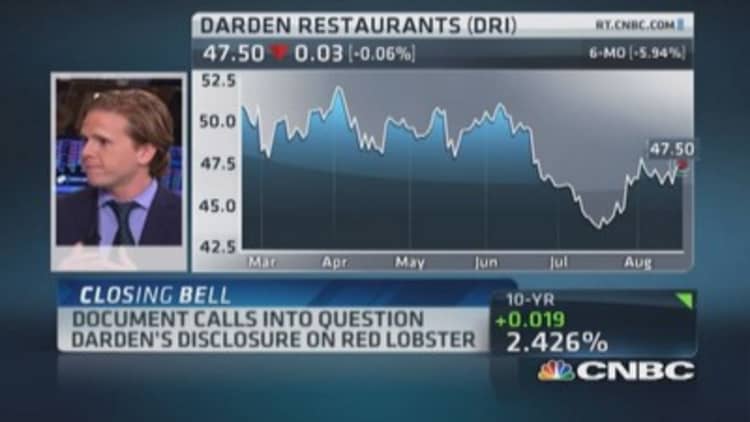A Darden Restaurants shareholder filed suit against the company's board of directors on Monday, citing a recent CNBC.com article as evidence that the board brought harm to the company by selling its Red Lobster restaurant division.
The suit, filed in a Florida state court by Teamsters Local 443 Health Services & Insurance Plan of Connecticut, argues that the board of directors of the Florida-based company knowingly approved the sale of Red Lobster at a "fire sale" price in order to protect their jobs.
The Teamsters cite an Aug. 19 CNBC story that revealed a confidential debt offering document issued by Red Lobster while it was still part of Darden in June. The document, which was used to market a $425 million loan to potential investors, said Red Lobster had suffered short-term problems that would soon turn around, leading to higher profits.
According to the suit, those forecasts reflected the true views of Darden. The suit alleges that Darden misled shareholders when it said publicly that Red Lobster business was in decline and needed to be sold.
"The Board sought to justify the rushed sale of Red Lobster by telling stockholders that the restaurant chain's recent poor performance was due to intractable structural problems that would inevitably result in worsening performance in the coming quarters and years," the suit said. "The Board knew that Red Lobster's debt offering documents, functioning as a loan application, would be subject to rigorous scrutiny and due diligence by potential lenders."
The suit goes on to say that "Red Lobster's management, which was responsible for the projections set forth in the debt offering documents, was best positioned to accurately assess and forecast the Company's recent, present, and future performance."
The suit comes after a long battle between Darden management and activist shareholders Barington Capital and Starboard Value. Both investors have urged Darden to split into two companies and spin off the real estate into a third vehicle. According to the lawsuit, Darden's board members took the alternative step of selling Red Lobster in order to avoid the more drastic moves suggested by the activists.
Read More
By selling Red Lobster, the directors were able to preserve their roles at a larger, more prestigious company at the expense of shareholders, the suit alleges. "The Board had very different, self-interested incentives when it downplayed Red Lobster's performance to Darden's shareholders," it said. "The Board knew at all relevant times that it was selling Red Lobster at an artificially low price to protect the Board members' directorships."
Darden declined to comment when contacted by CNBC.
The suit is known as a "derivative" case because the Teamsters are suing on behalf of the company. While the Teamsters own Darden shares, any financial damages would be paid to the company rather than the plaintiff. The Teamsters were also part of separate lawsuit against Darden in April, when it accused the company of altering its corporate bylaws in order to prevent shareholders from holding a vote on the plan to sell Red Lobster. While 57 percent of shareholders were in favor of holding such a meeting, Darden moved forward with the Red Lobster sale before shareholders were able to convene and hold a vote.

The suit also alleges that Darden's board rushed the Red Lobster sale so that shareholders wouldn't have any opportunity to stop it. "By knowingly rushing the sale of Red Lobster at an artificially low price to protect their own selfish interests in their Board memberships, each of the Director Defendants acted in bad faith and in violation of the duty of loyalty. As a result, Darden has suffered a massive loss," it said.
Read MoreDarden uses lobster claws on critical analysts
According to the suit, Darden received only a nominal sum for Red Lobster's operating business through the sale. Darden received $1.6 billion in after-tax proceeds from the transaction, but Golden Gate Capital, the buyer of Red Lobster, immediately sold the restaurant's real estate for $1.5 billion. That suggests the deal valued the operating business at just $100 million, the suit said.
Starboard Value has nominated its own slate of 12 directors to replace the entire board at the annual meeting in October. Earlier in September, Starboard also made a 294-page presentation outlining its plans to turn around the company. The activist investor argued that Darden's share price can rise significantly if the company follows it plan, which includes a separation of the company's real estate, splitting the company into two parts, and franchising the owned restaurants.
The Starboard presentation also underscores activists' frustration with the Red Lobster sale, saying it "affirmed our belief that the current Board members cannot be trusted to safeguard the best interests of shareholders."
Darden has suggested that only four of Starboard's nominees be placed on the board. The company has also proposed that four existing board members remain in place, along with four new individuals it has proposed.
Disclosure: John Jannarone was also the author of the Aug. 19 article cited in the lawsuit.

